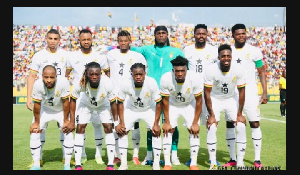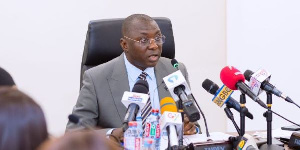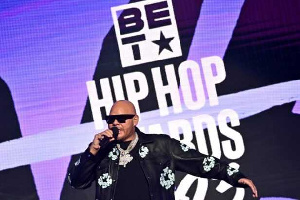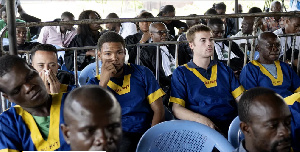- Home - News
- Polls
- Year In Review
- News Archive
- Crime & Punishment
- Politics
- Regional
- Editorial
- Health
- Ghanaians Abroad
- Tabloid
- Africa
- Religion
- Election 2020
- Coronavirus
- Photo Archives
- News Headlines
- Press Release
Press Releases of Thursday, 3 February 2022
Source: worldradioday.org
World Radio Day 2022 – Radio and trust
UNESCO calls on all radio stations to celebrate on the 13th of February the eleventh edition of World Radio Day, under the theme "Radio and Trust".
Building on more than a century of its history, radio remains one of the most trusted and widely used media1.
Throughout the years, radio provided quick and affordable access to information in real-time and professional coverage aPbout matters of public interest, as well as guaranteed distance education and entertainment. Bridging between “traditional” and state-of-the-art technologies, radio now offers a variety of content through different devices and formats, such as podcasts and multimedia websites.
Still, not all world citizens believe they get the information they need. Recent world events and the COVID-19 pandemic have eroded trust in the media in general2, fuelled by the circulation of false content rapidly spreading on social media.
Concomitantly, the financial context, the forced reduction of staff and the loss of advertisement to Internet companies have accelerated declines in news media revenue, including for radio, and raised the costs of verified information, particularly for local radio outlets.
However, specific media studies reveal a global decline in trust in the Internet and social networks3, but a rise in overall trust in the news4. And many citizens still ascribe greater confidence in radio than in any other media5. This confidence level further reinforces the importance of providing citizens with accurate and reliable information whatever its costs, this being what people expect from media in current times when lives are at stake.
Part of people’s trust in radio is due to its low cost and ubiquitous nature. Despite digitalization being a global tendency, digital access to information is far from being equal with huge differences remaining between regions and between communities, in terms of both Internet subscription and ownership of computers at home6.
In comparison, radio remains affordable and can be listened to everywhere, even when electricity or connectivity is not reliable. Radio is thereby one of the most popular means of communication, used by an overwhelming majority of people.
Digitalization further favors radio’s impact as an important source of information for persons with disabilities since new services and content can be developed to harness the capacities of smart speakers or accessible radio receivers.
This and other types of diversity and inclusion are becoming crucial to maintain and raise trust levels in media. In this respect, radio also has a key role to play, since it can fit in programs for minorities or give the microphone to specific communities in easier ways than other types of media, which would require an expensive roll-out of language services or camera teams to do so.
Community radio, for instance, reaches out to those under-represented in mainstream and social media, who may feel better understood and fairly portrayed and consequently attribute trust to their local station. Radio can comfortably answer audiences’ call for diversity in the newsroom and editorial content.
SUBTHEMES
Trust in radio journalism
Produce independent and high-quality content
Respecting basic standards of ethical journalism has become challenging in the present high-tempo digital age. However, in order to keep or raise listeners’ trust, journalism must continue to be based on verifiable information that is shared in the public interest, holds the powerful to account, and helps society build a better future for all.
In this context, editorial independence is essential, as it may show the ability of radio stations to bring news free of influence. Moreover, the understanding of digital technologies and social platforms is key to avoiding the circulation of unverified information. Investing in fact-checking, investigative journalism and rigorous verification of sources and content are some of the practices radio broadcasters could strengthen to keep audience trust.
An informed audience equipped with Media and Information Literacy competencies is also necessary, so that listeners discover, consume, and respond critically to content, and thereby appreciate the quality journalism that the radio station is bringing to them. More and more radio stations are therefore including media and information literacy shows in their programming schedule.
Trust and accessibility
Take care of your audience
Gaining listeners’ trust implies conveying diversity in all its forms: staff origins, information sources, formats, distribution channels, programming, editorial content, etc. People who feel represented and can access information that is relevant to them may become loyal listeners.
However, reaching out to a selected audience group implies serving the informational needs of all listeners and being a catalyst for integration and social participation - including persons with disabilities. Digital radio platforms provide grounds for innovation in the accessibility of content for the latter, such as the use of sign languages or automated subtitles for the hearing-impaired audiences when streaming, or announcements of content for blind listeners.
Furthermore, voice being the main communication resource in radio, stations with the ability to recruit personnel with disabilities, for example, blind radio hosts, could let it be known. Their experience could be inspirational for listeners.
In terms of diversity, participatory radio such as community radio is likewise important to ensure that communities of interest, especially hard-to-reach, under-represented, or diaspora groups, do not feel at the margins of news making and can credit radio with their confidence.
Trust and viability of radio stations
Ensure competitiveness
How can radio survive when a financial crisis hits the media market? How to transform loyal audience engagement into financial sustainability?
This sub-theme links the economic survival of radio stations to their ability to attract and retain a large enough base of loyal listeners to be sustainable or to embed listener interaction into their business models.
Most radio stations are small or medium enterprises, when not totally non-profit, and find themselves in a dire situation. Even public service broadcasting is facing license fee cut plans and reticence from citizens to pay audio-visual taxes in times of streaming services and Web radio when they can access content otherwise.
New funding models are to be researched and discussed, for instance, subscriptions, membership models, pay-per-listened content, very local advertisement, and others.
Official hashtags:
#WorldRadioDay
#JournéeMondialedelaRadio
#DiaMundialdelaRadio
CONTACT
Coordination of World Radio Day
Davide Storti, [email protected]
Eugenia Rudenko, [email protected]
Xu Jing, [email protected]
https://worldradioday.org











